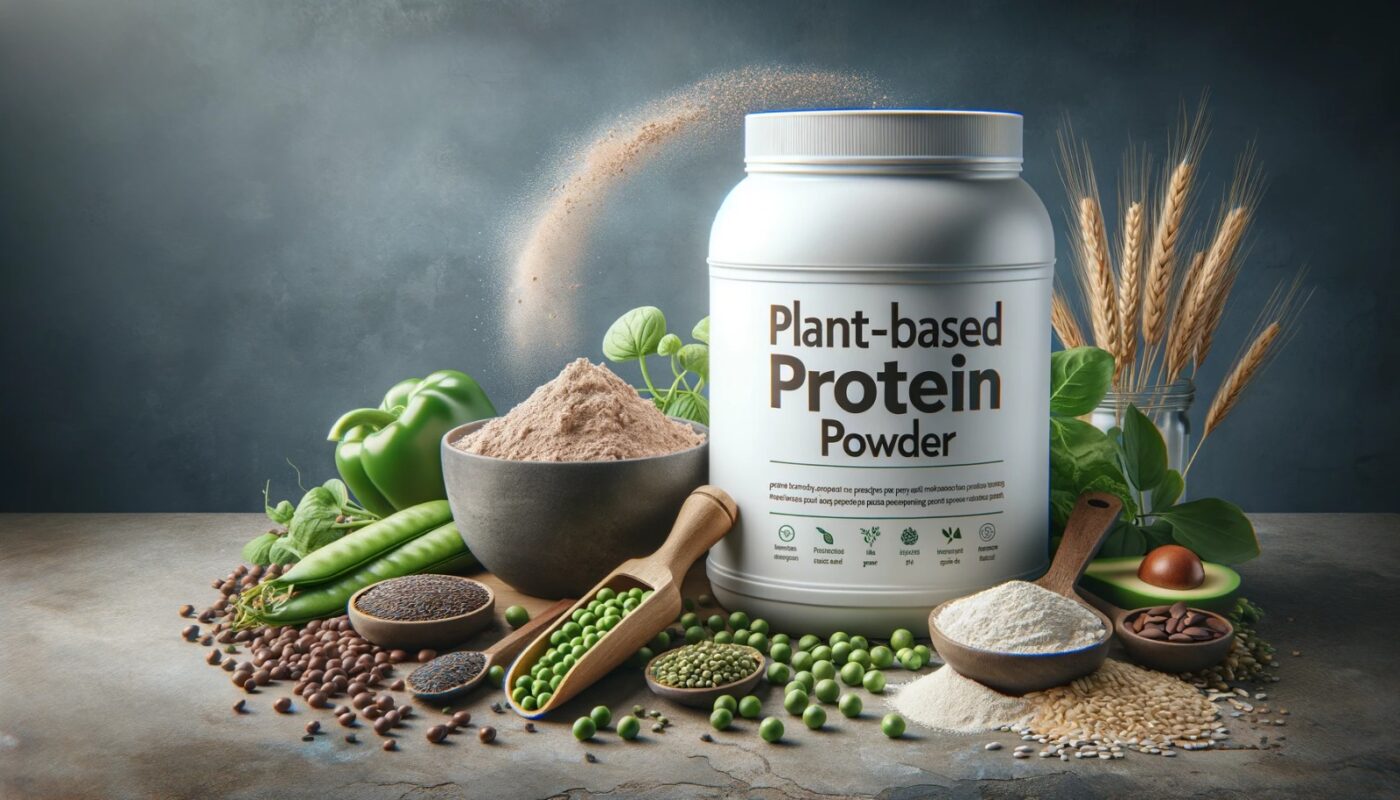Plant Based Protein Powder
Plant based protein powder has been gaining popularity among athletes and health-conscious people. They are made of various plant materials, including peas, hemp, and brown rice, and are a great alternative to traditional Protein Powders. Protein powders made from plants have numerous advantages, such as being simpler to digest, offering a complete amino acid profile, and being more environmentally sustainable.
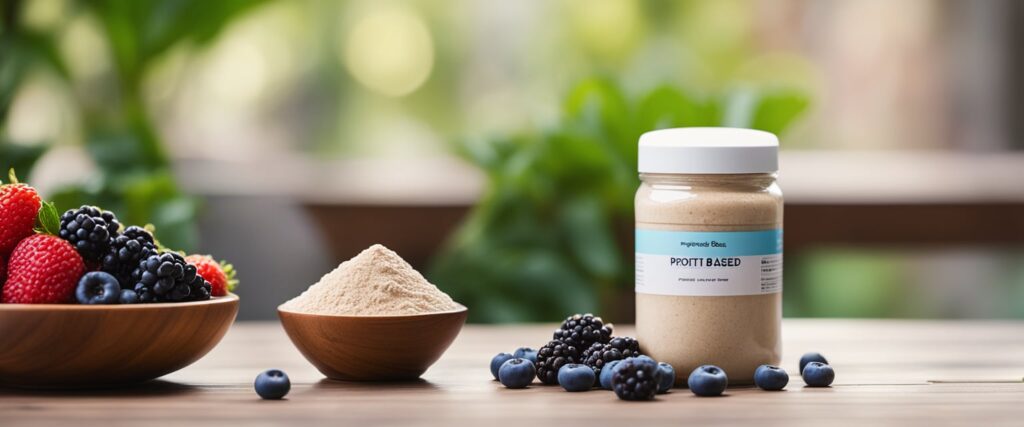
One of the biggest positives of protein powders derived from plant sources is their nutritional content. Most plant based protein powders have the nine amino acids essential to life, making them a complete protein source. In addition, these protein powders generally have lower fat and calories than animal-based ones, making them a great opportunity for those who want to reduce or maintain an ideal weight. Protein powders made from plants are filled with fiber that could regulate digestion and help you feel fuller for a longer time.
Key Takeaways
- Plant based protein powder has various advantages. It is much easier to digest, has an entire amino acid profile, and is more environmentally sustainable.
- Many plant based protein powders contain the nine amino acids essential to life, making them a complete protein supplement and a great option for those who want to shed or maintain an ideal weight.
- Plant based protein powders are full of fiber. They may help maintain digestion and help you feel fuller for longer durations.
Benefits of Plant Based Protein Powder
Plant based protein powder has become more popular with health-conscious people. Here are a few advantages of including plant based protein powder in your daily diet:
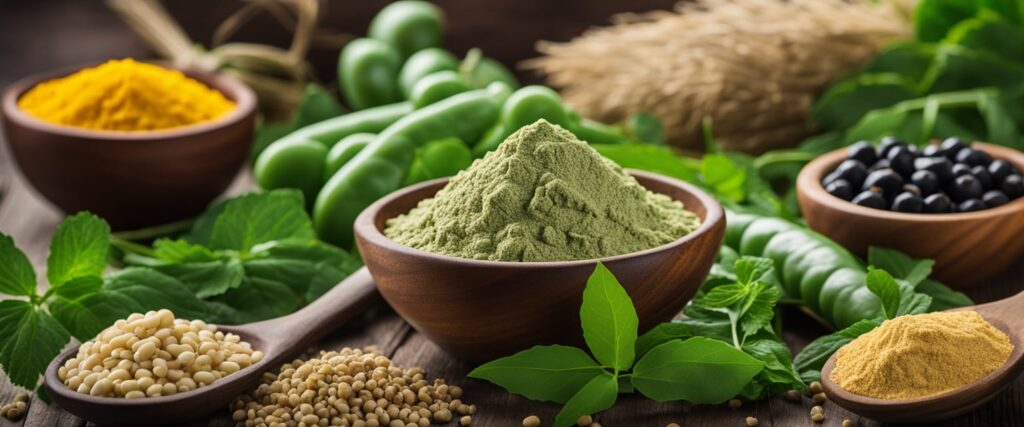
1. Rich in Nutrients
Plant based protein powder can be a fantastic source of important nutrients, including vitamins, minerals, and antioxidants. It’s also high in fiber, which helps maintain a healthy digestive system and keeps the body fuller throughout the day.
2. Easy to Digest
Plant based protein powder is simple to digest and won’t create bloating or discomfort as many vegan protein powders. They are a good replacement for those with digestive issues.
3. Environmentally Friendly
Plant based protein powder is much greener than animal-based protein powders. Making animal-based protein powders takes many resources like water and soil, and creates greenhouse gas emissions. In contrast, plant based protein powders require fewer resources to make and produce and have a much smaller environmental footprint.
4. Versatile
Protein powders made from plants can be utilized in many ways by mixing them into smoothies and shakes or as baking ingredients. They are a flexible and practical source of protein for those who lead busy lives.
Plant based protein powder is nutritious, easily digestible, environmentally sustainable, and a versatile source of protein that can be effortlessly incorporated into your healthy diet.
Types of Plant Based Proteins
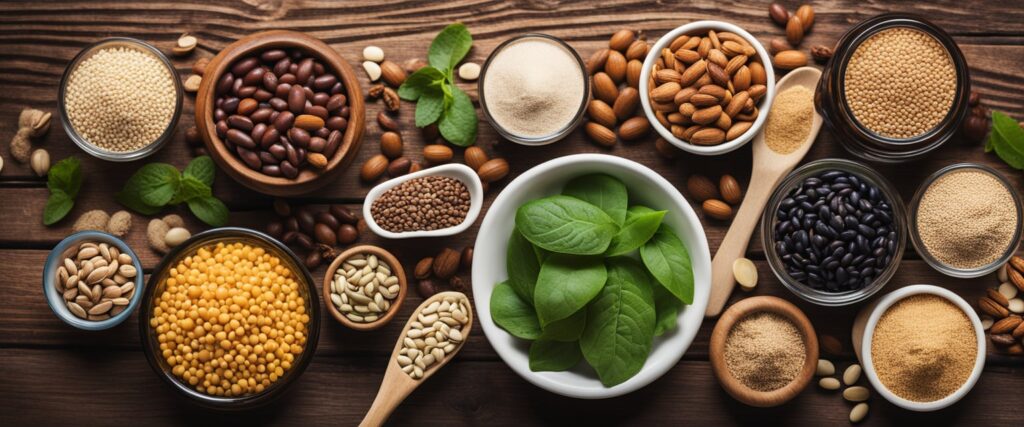
Plant based protein powder is growing in popularity among people concerned about their health. They can be a fantastic alternative to protein powders made from animal sources when you are on an omnivore or vegan diet or lactose intolerant. Below are a few of the most popular kinds of plant-based protein:
Pea Protein
Pea protein is a fully formed protein derived from yellow peas. It’s an excellent source of protein and easy to digest. It is also high in branched-chain amino acids (BCAAs), vital for muscle growth and repair.
Rice Protein
Rice protein is a hypoallergenic protein found in brown rice. It’s a fantastic source of protein for people who suffer from food sensitivities or allergies. Rice protein is also rich in methionine and cysteine, both of which produce glutathione, a powerful antioxidant.
Hemp Protein
Hemp protein comes from the plant’s seeds. It’s a fantastic source of fibre, protein, and healthy fats. It is abundant in essential fatty acids that are essential in brain function and general well-being.
Soy Protein
Soy protein comes from soybeans. It is an all-inclusive protein that is easy to digest. It’s a fantastic protein source for vegans and vegetarians. Soy protein is also high in isoflavones, which are proven to provide positive health effects, including reducing the risk of developing heart disease.
Mixed Plant Proteins
Mixed plant proteins are powders produced from an assortment of plant-based sources. They are typically used to create a full protein profile and provide more nutrients. Common plant sources utilized in the mix of plant proteins are peas, rice, hemp, and Chia seeds.
There is a variety of protein powders made from plants available in the marketplace. Each one has its own benefit and could be utilized to satisfy various nutritional requirements. It’s important to pick the excellent protein powder available to meet your nutritional needs and personal preferences.
Nutritional Profile
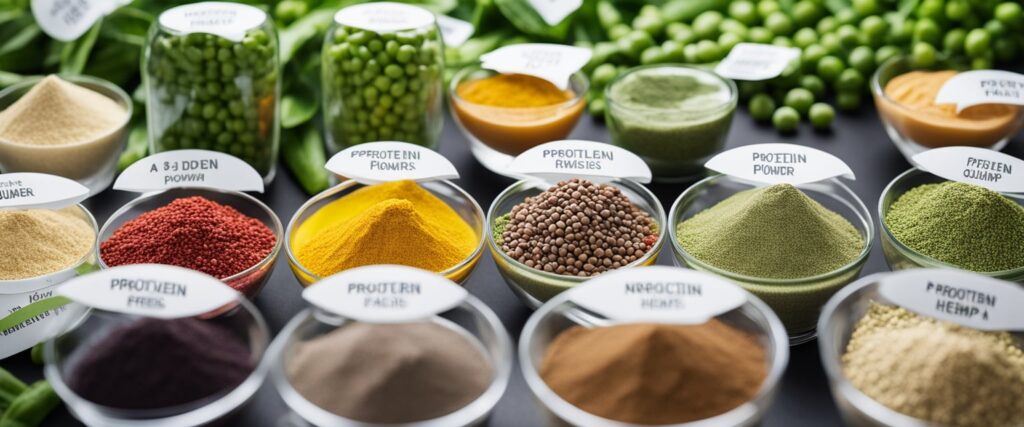
Plant based protein powders are gaining popularity among health-conscious consumers. They’re an excellent alternative to protein powders made from animal sources and provide many important nutritional elements. This is a summary of the nutritional content of plant-based protein powders.
Protein Content
Protein powders made from plants can be a fantastic source of protein. The majority of powders have 20-25 grams of protein in each serving. Protein in these powders is derived from many sources, such as peas, rice, hemp, and soy. They are believed to be full of protein, meaning they include all the essential amino acids the body requires but cannot make on its own.
Carbohydrates and Fats
Protein powders made from plants are generally lower in fats and carbohydrates, making them an excellent choice for those who follow a low-fat or carbohydrate diet. The majority of plant based protein powders have under 5 grams of carbs and less than two grams of fat in each serving.
Vitamins and Minerals
Protein powders made from plant based proteins provide a wealth of minerals and vitamins. Most powders are enriched with minerals and vitamins like vitamin B12, iron, and calcium, which can be deficient in a vegan or vegetarian diet.
Fiber Content
Protein powders made from plant sources are excellent sources of fiber. They typically contain five grams of fiber in each serving, which will keep you full and satisfied for longer durations.
All in all, protein powders derived from plant sources can be a fantastic choice for those who want to boost the amount of protein they consume and also obtain a wide variety of vital nutritional supplements.
Muscle Building and Recovery
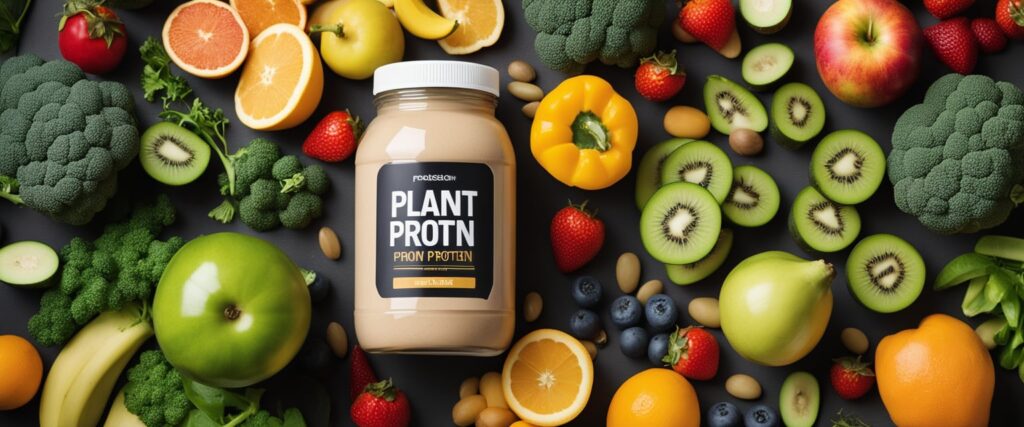
Protein powders made from plant-based sources are a great source of protein to aid in muscle development and recovery. They’re high-quality protein that is easy to digest and absorbed by the body.
One advantage of protein powders made from plant sources is the fact that they’re low in calories and fat. They are a great selection for those looking to gain muscular mass, without having to gain weight.
Apart from proteins, protein-rich plant powders are also rich in amino acids, which are vital for muscle growth and repair. The amino acids also help ease muscle soreness and assist in muscle recovery after training.
A few of the excellent plants-based protein powders that aid in recovering and building muscle comprise pea protein and brown rice protein, as well as hemp protein. These powders are full of amino acids, and deliver an all-inclusive protein that is crucial to repair and build muscle.
All in all, plant based protein powders are a fantastic choice for those who want to increase lean muscle mass and assist in muscle recovery. They favour an excellent protein source that’s easily digestible and absorbed by our bodies, which makes them a great option for fitness and sports fans alike.
Digestibility and Absorption

Protein powders made from plants are known for their superior digestion and absorption rates and are a good selection for both fitness and athletic fans. In contrast to animal-based protein powders plants-based protein powders are not contaminated of lactose, cholesterol as well as other allergens. This makes easy to digest and absorb.
One of the most important elements that affect the rate of absorption and digestibility of protein powders made from plant sources is the amino acid composition. The amino acids that are essential play a vital role in protein synthesis in muscle as well as plant based protein powders with all nine of the essential amino acids are regarded to be full protein sources. A few of the most well-known plant-based protein sources which contain complete proteins are the following: quinoa, soy, and hemp.
A third factor that influences the absorption and digestibility of protein powders made from plant sources is the processing method used to extract protein. Plant-based cold-pressed and minimally processed protein powders are typically more absorbable and digestible than those that have been heavily processed.
The bottom line is that plant based protein powders are extremely absorption-friendly and digestible due to the amino acids they contain and the processes they undergo. They’re an ideal alternative for people who want to increase their protein intake, whether active, fitness-minded, or just looking to improve their general well-being and overall health.
Environmental Impact

Protein powders made from plants are a greener opportunity than animal-derived protein powders. Producing animal-based protein powders demands large amounts of land, water, and animal feed. This outcome has an environmental impact that includes carbon dioxide emissions and pollution.
On the other hand, plant based protein powders leave a less environmental footprint. They consume less land and water and produce fewer greenhouse gases. In addition, these protein powders usually come from waste products from food processing, which reduces the amount of waste.
A few plant based protein powders can be available in sustainable packaging, such as biodegradable bags or recycled plastic containers. Making these choices can help lower the environmental impact of protein powder consumption.
Ultimately, using proteins made from plants can positively impact the planet. By reducing the need for protein powders made from animals, consumers can benefit from reducing the environmental impacts on food production.
Taste and Flavor Varieties
Protein powders made from plant-based sources come in various flavors and tastes to satisfy various tastes. A few of the most well-known flavors are chocolate, vanilla, and fruit.
Many companies offer distinctive flavour options, such as chai, matcha, or coffee. These flavours are appealing to those looking to change up their protein powder regimen or spice up their meals.
Apart from the usual flavours, certain protein powders made of plant ingredients come in plain or unflavored varieties. This is a great option for those who like adding their own flavourings or sweeteners to their smoothies and shakes.
Some plant based protein powders have a hard or chalky taste. Many companies have reformulated their formulations to give a smoother and more pleasant feel.
In the end, a wide range of flavor and taste options are available to those who want to integrate vegan protein powders into their daily eating habits. By experimenting with different types and tastes, consumers will be able to discover the right protein powder to meet their preferences and nutritional requirements.
Usage and Serving Suggestions
Plant-based protein powder is an incredibly versatile ingredient that can be utilized in many ways to support your active life. Below are some use and serving tips to help you get the most from this powder.
1. Post-Workout Recovery
Consuming protein following a workout is vital to boosting muscle growth and recovery. Mix a scoop of plant-based protein powder in a glass of water or plant-based milk to make a simple and quick post-workout drink.
2. Meal Replacement
The plant based protein powder could be utilized as a food substitute when you’re working or needing to cook all the ingredients for a complete dinner. Mix a few scoops of the powder with plant based water or milk with some fruit or veggies for a nutritious and filling food.
3. Baking and Cooking
Protein powder made from plant-based sources can be used in cooking and baking to grant protein and nutrients to your favorite recipes. It is a great addition to pancakes, smoothies, muffins, or even savoury meals, such as soups and stews.
4. Serving Suggestions
Here are some suggestions for serving to make the protein powder made from plants more appealing:
- Mix frozen fruit with plant milk for a wonderful smoothie.
- Mix it into yogurt or oatmeal to boost your protein intake.
- Make a delicious topping for waffles and pancakes.
- Mix it with nuts and dates to make a delicious protein bar.
- Mix it into stews and soups to boost protein.
Comply with the directions for serving the protein powder made from plant sources, and talk to a medical professional before introducing any other supplements into your food regimen.
Choosing the Right Plant Based Protein Powder
In the process of selecting the most appropriate vegan protein powder made from plant sources, there are many things to think about. Below are some suggestions that will benefit you in making an educated selection:
1. Protein Content
One of the first things to consider is the Protein content of the powder. You should look for a product that contains at least twenty grams of protein in each serving. This will ensure you get satisfying protein to strengthen your exercise muscles and help during recovery following exercise.
2. Source of Protein
Many plant based protein powders can be created from different protein sources, including rice, pea hemp, hemp or soy. Each protein source comes with its own distinct amino acid profile therefore it is important to select one that is the complete protein source. The combination of several sources may offer more amino acid profiles.
3. Additives and Sweeteners
Certain plant based protein powders have sugars and other additives that are unsuitable for you, like artificial flavour and colours or sweeteners. Find powders without these ingredients and sweeten them with natural sweeteners such as stevia or monk fruit.
4. Price
The price is another important aspect to take into consideration. Powders made of plant-based proteins can range significantly in cost, therefore it is important to choose the right powder within the budget you have set. Remember that the higher-priced powders could include higher-quality ingredients, or may be produced sustainably.
If you consider these points when choosing an organic protein powder, it will be suitable for your requirements and help you achieve your fitness and health goals.
Storage and Shelf Life
Plant based protein powders are an efficient and safe method of improving your protein intake. However, it is vital to store them properly to preserve their high quality and freshness.
Keeping the plant-based protein powder in a dry, cool area away from direct sunlight and moisture is advised. Exposed to extreme heat or humidity, the powder could get clumped and reduce its effectiveness. This is why storing the powder in an airtight container within an open cupboard or pantry is perfect.
The shelf-life of plant based protein powders differs based on the manufacturer and the components employed. Most of the time, sealed containers will last for several years, and open containers last for at least six months when maintained properly. Be sure to verify the expiration date before consuming the powder, since it is possible that it has expired may cause stomach issues, and might not help in providing the nutritional benefits you want.
To warrant the longest shelf life, it’s advised to utilize a dry scoop or spoon to measure the powder. Also, avoid getting water in the container. In addition, it is essential that you follow the manufacturer’s instructions regarding storage and usage to preserve the item’s quality and efficiency.
Frequently Asked Questions
What are some health advantages of using plant-based protein powder together?
Protein powder made from plant sources is a great source of protein for people seeking to boost the amount of protein they consume daily. It may benefit muscle development and repair, assist in losing weight, and boost general well-being. Protein powder made from plants is abundant in amino acids, vitamins, and minerals, which make it a fantastic ingredient to add to a balanced diet.
What is the plant based protein powder’s contrast with whey protein?
Protein powder from plant sources is an excellent substitute for whey protein for those who suffer from lactose intolerance or eat a vegan vegetarian diet. Although whey protein comes from milk, plant-based protein powders are produced from various sources, such as peas, rice, and hemp. Protein powder made from plants is less difficult to digest and may provide the same benefits as whey protein when it comes to helping to support muscle repair and growth.
Protein powders made from plant sources can be efficient in losing weight.
Plant based protein powder could indeed be beneficial for losing weight. Protein keeps people satisfied and full, which can translate into an overall reduction in calories consumed. Furthermore, plant-based protein powder tends to be lower in calories and fat than other protein sources, making it a fantastic opportunity for those who want to slim down.
What are the most important components of high-quality protein plant powders?
The perfect plant based protein powders must comprise a mixture of proteins such as rice, peas, and hemp. They should also be free of artificial sweeteners, flavourings, and colourants. Choose verified organic and non-GMO powders to warrant only the finest quality ingredients.
How does plant based protein powder help to improve muscle mass?
Protein powder from plant sources contains the nine amino acids the body requires to aid muscle recovery and growth. It also contains branched-chain amino acids (BCAAs), which are crucial for the recovery of muscles. Ingestion of plant-based protein during a workout could support muscle recovery and growth.
What do I need to look for to locate the purest protein powder made from plants?
To get the most pure protein powder made from plants, search for products that are organic, non-GMO, and without artificial components. Beware of powders with artificial sweeteners, added sugars, and flavours. Choose powders of whole foods like rice, peas, and hemp to get the most pure and organic features.
Conclusion
Plant based protein powders are fantastic when you want to increase your protein intake without consuming animal products. They have many benefits, including high protein content, easy digestibility, and various other nutritional benefits.
If you are considering the perfect plant-based protein powder, you must consider things like protein content, the quality of the ingredients, and flavour. A few popular choices include rice protein, pea protein, and hemp protein, each with its own distinctive nutrition description.
Plant based protein powders are a great supplement to your healthy lifestyle, offering a simple and cost-effective way to satisfy your daily protein requirements. There are so many choices available that you must conduct your own research before settling on the one that perfectly suits your particular preferences.
